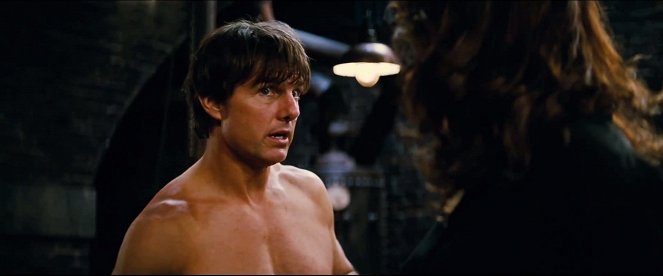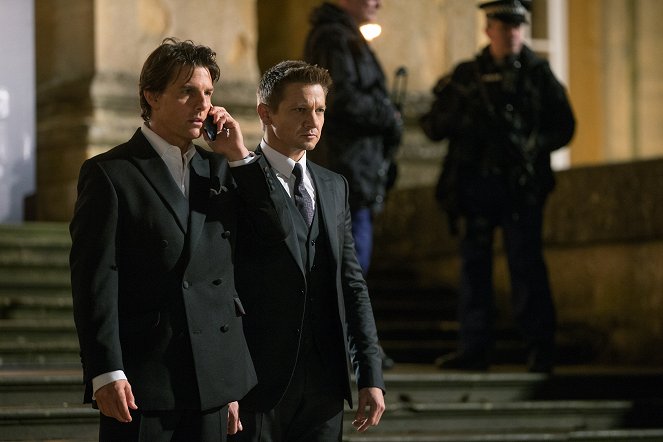Directed by:
Christopher McQuarrieScreenplay:
Christopher McQuarrieCinematography:
Robert ElswitComposer:
Joe KraemerCast:
Tom Cruise, Simon Pegg, Rebecca Ferguson, Jeremy Renner, Ving Rhames, Alec Baldwin, Sean Harris, America Olivo, Simon McBurney, Jingchu Zhang, Tom Hollander (more)VOD (1)
Plots(1)
With his elite organization shut down by the CIA, agent Ethan Hunt (Tom Cruise) and his team (Jeremy Renner, Simon Pegg, Ving Rhames) race against time to stop the rise of a new global threat, The Syndicate, a dangerous network of rogue operatives turned traitors. To stop them, Ethan must join forces with an elusive, disavowed agent (Rebecca Ferguson) who may or may not be on his side as he faces his most impossible mission yet. (Paramount Pictures)
(more)Videos (18)
Reviews (12)
An elemental blockbuster mixing old style with modern, where every blow hurts a lot and gives out a good meaty slap. The shots of Rebecca Ferguson are an ode to legs and Tom may be getting old, but he’s getting harder with age in action scenes (because it looks better), and he knows how to make fun of himself. McQuarrie’s screenplay is a really classic British school spy chase movie that often goes against the standard procedures for the series. The action is first-rate, the editing is a joy to watch (the opera) and my teeth were chattering from the antics in Morocco. I look forward to watching it again. If you managed to read to the end of it, this review will self destruct in 5 seconds...
()
“Good luck!” Self-aware in a post-modern way, Rogue Nation is a high-octane action/spy flick with by far the best action scenes, an enthralling narrative, a very unpleasant bad guy, a very pleasant female character (in terms of both looks and behaviour), and plenty of nostalgic allusions to the series (where the Syndicate first appeared) and the preceding films (Moscow, the rabbit’s foot, motorcycles, the mention of infiltrating CIA headquarters). Viewers who considered any of the previous four M:I movies to be the best of the franchise should thus theoretically be satisfied. ___ Despite its more or less episodic structure, the film is cohesive not only on the level of smaller plot segments, but also thanks to their interconnection. McQuarrie constantly repeats crucial information and places it in new contexts for greater clarity, without losing sight of the central theme of fatefulness and chance, thanks to which some of Hunt and Loan’s decisions are justifiable (it’s easier to forgive numerous coincidences in a film that thematises the randomness of fate), and he doesn’t forget that he is filming a team event, not a solo performance. The relationships between the team members, the losing and gaining of trust between them, replaces the usual romantic relationship storyline, which the film managed to avoid entirely, much to my delight. (Surrendering to Hunt’s magnetic charisma would only detract from the believability of the fearless female double/triple agent.) Almost all of the action scenes are given dynamics by cutting between multiple characters, and Hunt repeatedly finds himself in situations from which he would not have safely escaped without outside help. The unification of the team roughly halfway through the film, when all four of them sit at the same table for the first time, is a key turning point. There is a shift in genre from “exotic” action adventure towards spy thriller, which also corresponds to the change of colour tone (warm colours are replaced with cool ones). The film continues to focus mainly on gathering and assessing information, but not in such adrenaline-fuelled ways. ___ McQuarrie’s concept of the action also adds pleasing variety to the torrent of loud action scenes with quick cuts. The scenes are relatively well arranged and, thanks to the “live” shooting, they are also very physical and evoke a strong feeling of danger (with its intensity, the diving scene is comparable to certain moments in Gravity), and they also work superbly with the alternation of longer and shorter shots, noise and silence. In addition to that, each of the action sequences has its own developmental formula while also advancing the main narrative (the IMF’s reputation, the capture by Lane). ___ In addition to serving as a warmup, the delightfully escalated pre-title action serves as the final nail in the IMF’s coffin. The next two major events are first presented separately, like episodes of a series (the sound of classical music as Benji plays on an Xbox foreshadows the scene at the opera, Ilsa’s diving in the pool foreshadows Hunt’s underwater mission), and each is riveting thanks to the different approaches to distributing information. In the first case, we know just as little as the protagonists and we are subsequently just as surprised as they are. Conversely, in the second case, the plan is laid out in detail in advance and we wait anxiously to see when and how badly it will go wrong. A third striking example of clever work with audience expectations and an unreliable narrative (or rather a narrative that doesn’t tell us everything) is the action that takes place in London, suggesting to us that we know more than some of the characters (Brandt’s telephone call), but it immediately turns out that we were in fact led down a blind alley. From the humorous scene in Cuba, which is only half of Cuba, we are led to approach what we see, what we hear and what we infer from our knowledge of classic narrative norms with a degree of circumspection. ___ We can see a significant part of the plot as one big MacGuffin, which tempts the characters off of the path leading straight to the objective. But like the third instalment, Rogue Nation is an action movie about action movies, as the film itself draws attention to the structure that carries its action scenes. It knows that we know. It knows the rules of the game just as well as the viewers do, and it therefore bends those rules to suit its own needs and it isn’t afraid to significantly deviate from them (the slowing of the pace and the “multiplication” of the villains in the second half). What is important for us, however, as in the case of Hitchcock’s films (with comparably implausible plots), is how entertaining and thrilling this messing around with the rules is. Speaking for myself, I can say that it is maximally entertaining and thrilling. Appendix: A quarter of a star is given for the director’s (cinematographer’s?) fetish for women’s feet and shoes. 90%
()
(less)
(more)
It's as if I were seeing on the screen my first spies, my first car chase, my first badass fight scene. As if Christopher McQuarrie were in a room I know well, using Ethan Hunt's hand to open a door that has been carefully hidden. And as if beyond it, a game is afoot from the old school, where there is room for London fog, surprising paraphrases of Casablanca, and in the spirit of the series, even truly impossible missions, above all with a water tank where I was almost holding my breath for the main hero at the end. Before viewing, I didn't have much hope for stepping in the same river a fifth time, so getting up from this ever more appealing team is getting tougher and tougher. Welcome to the IMF.
()
I cannot deny that I really enjoyed Rebecca Ferguson and all that neatly shot, imaginative and various actions scenes without overt-the-top CGI (especially the motorcycle scene is simply perfect), but what is the best thing about it (apart from Rebecca Ferguson, of course) is the final minimalist personal London third, when it definitely turns into a classic British-style spy film, where the well-written characters (not only in terms of action blockbuster) mess with each other using dialogs "I know that you know and you know that I know" at the airport, in the room or on the restaurant terrace, and it completely does without any action. And it works, because it's not silly at all, while respecting the principles of the genre, and McQuarrie makes you forget that twenty years ago, in terms of script, he was able to do with one room and unfortunate narrator. As you can clearly see from this, he was mainly concerned about the characters and the plot and the action and tinsel were sidelined; which is an unprecedented thing for a summer popcorn movie, which in fact it is not.
()
Mission: Impossible – a nation of bastards in a glass cube: the best villain in the history of the series, the best car chase since the third Bourne, the most dangerous James Bond on heels of all time, hi-tech and retro, slow and furious, brilliant minimalist finale and Tommy Boy in the best form of his life. In the end, I roared with bliss like tur (andot). It’s different than the architecturally decorated part four, but still bad-ass. This is why you go and stare at an unreasonably large screen. Spectre is going to have a really hard time.
()


